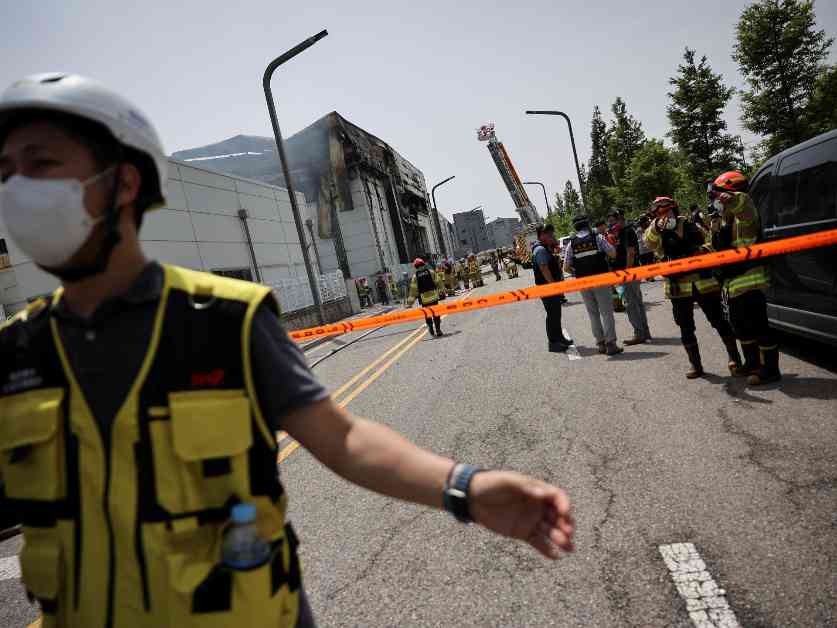Aricell, a South Korean lithium battery factory, is under scrutiny after a deadly fire broke out in June, resulting in the loss of 23 lives. The tragic incident has shed light on a series of safety failures and quality control issues within the company, ultimately leading to one of the country’s worst industrial disasters in recent years.
Safety Failures and Quality Control Issues
According to police officials, the fire at the Aricell lithium battery plant was a direct result of the company’s negligence in addressing signs of dangerous quality failures. Aricell had failed a quality inspection in April but instead of rectifying the issues, the company chose to ramp up production to meet a looming deadline. This decision, coupled with the hiring of temporary and unskilled workers, led to a significant increase in product defect rates, including overheating of finished batteries.
Furthermore, Aricell had a history of manipulating test samples during previous inspections to pass quality checks. This deceptive practice dates back to the company’s supply of battery products to the military in 2021, highlighting a pattern of dishonesty and disregard for safety protocols. The Ministry of Employment and Labor, along with the police, have sought an arrest warrant for three Aricell officials, including CEO Park Soon-kwan, in connection with the deadly fire.
Manufacturing Pressure and Safety Violations
The police investigation revealed that Aricell was striving to produce 5,000 batteries per day, leading to what authorities described as “excessive manufacturing.” This relentless pursuit of meeting production quotas without addressing underlying safety risks proved to be a fatal mistake for the company. The lack of emergency exits, inadequate safety education for non-Korean speaking employees, and overall non-compliance with factory safety laws further exacerbated the severity of the situation.
Security camera footage from the factory showed the fire originating from a stack of batteries and rapidly spreading throughout the facility where thousands of lithium batteries were stored. The toxic smoke emitted by the blaze incapacitated workers within seconds, leaving many unable to escape the inferno. Tragically, the majority of the deceased workers were found on the wrong side of the emergency exit, highlighting the gross deficiencies in emergency preparedness and safety protocols at Aricell.
International Impact and Loss of Lives
The devastating consequences of the fire at the Aricell lithium battery plant reverberated beyond South Korea, with 17 Chinese workers and one Laotian worker among the casualties. The loss of lives in such a preventable tragedy underscored the need for stringent safety regulations and enforcement in industrial settings. The failure to implement adequate safety measures not only resulted in loss of life but also highlighted the dire consequences of prioritizing production quotas over worker safety.
South Korea’s History of Industrial Disasters
South Korea has faced a series of deadly incidents in recent years, with safety lapses and regulatory failures often cited as contributing factors. From the Halloween stampede to the recent hotel fire in Bucheon that claimed seven lives, these incidents serve as stark reminders of the importance of upholding safety standards in all industries. The recurring pattern of industrial disasters underscores the urgent need for comprehensive safety measures and strict enforcement of regulations to prevent future tragedies.
Lessons Learned and Calls for Accountability
The tragic fire at the Aricell lithium battery plant serves as a sobering reminder of the consequences of negligence and lack of accountability in the workplace. As authorities continue their investigation into the incident, calls for accountability have grown louder, with demands for justice for the victims and their families. The lessons learned from this preventable tragedy must serve as a catalyst for improved safety practices and stricter adherence to regulations in all industries.
Addressing Safety Failures and Implementing Reforms
In the aftermath of the deadly fire at the Aricell lithium battery plant, there is a pressing need for comprehensive reforms to prevent similar incidents in the future. Authorities must conduct thorough inspections of industrial facilities to identify safety violations and ensure compliance with existing regulations. Companies like Aricell must be held accountable for their negligence and face severe consequences for endangering the lives of their workers.
International Cooperation and Safety Standards
The international community must also come together to establish universal safety standards and promote best practices in industrial safety. Collaborative efforts between countries can help prevent cross-border incidents and ensure the protection of workers worldwide. By sharing knowledge and expertise in safety regulations, countries can work towards creating a safer and more secure work environment for all.
Empowering Workers and Promoting Safety Culture
Empowering workers to speak up about safety concerns and fostering a culture of safety within organizations are crucial steps towards preventing future tragedies. Companies must prioritize employee well-being and invest in comprehensive safety training programs to equip workers with the knowledge and skills to identify potential hazards. By fostering a strong safety culture, companies can create a workplace where the well-being of employees is paramount.
Conclusion
The deadly fire at the Aricell lithium battery plant in South Korea serves as a tragic reminder of the devastating consequences of safety failures and negligence in the workplace. The loss of 23 lives in one of the country’s worst industrial disasters underscores the urgent need for comprehensive safety reforms and strict enforcement of regulations. As authorities continue their investigation and calls for accountability grow louder, it is imperative that lessons are learned from this preventable tragedy to prevent future incidents and protect the lives of workers worldwide.



























